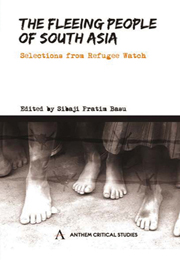Book contents
- Frontmatter
- Contents
- Acronyms and Abbreviations
- Foreword by Ranabir Samaddar
- Preface
- ETHICAL ISSUES
- LAWS
- SOUTH ASIA
- INDIA
- GENDER
- Introduction
- Refugee Repatriation: A Politics of Gender
- Families, Displacement, Partition
- Widows of Brindaban: Memories of Partition
- Agony Continues: Refugee Women of Bhutan
- Dislocating Women and Making the Nation
- Geder, Media and the Tsunami
- Why Should we Listen to Her?
- Women, Trafficking and Statelessness
- The Bar Dancer and the Trafficking Migrant: Globalization and Subaltern Existence
- INTERVIEW/CORRESPONDENCE
- REPRESENTATIONS
- Index
Introduction
from GENDER
Published online by Cambridge University Press: 05 March 2012
- Frontmatter
- Contents
- Acronyms and Abbreviations
- Foreword by Ranabir Samaddar
- Preface
- ETHICAL ISSUES
- LAWS
- SOUTH ASIA
- INDIA
- GENDER
- Introduction
- Refugee Repatriation: A Politics of Gender
- Families, Displacement, Partition
- Widows of Brindaban: Memories of Partition
- Agony Continues: Refugee Women of Bhutan
- Dislocating Women and Making the Nation
- Geder, Media and the Tsunami
- Why Should we Listen to Her?
- Women, Trafficking and Statelessness
- The Bar Dancer and the Trafficking Migrant: Globalization and Subaltern Existence
- INTERVIEW/CORRESPONDENCE
- REPRESENTATIONS
- Index
Summary
The more refugees suffer, the more women suffer. Women and their dependent children constitute over 80 per cent of the world's refugee population. This sheer quantity makes the refugee issue largely and qualitatively a gender issue. In this section, a host of writers and activists pen the pains and agony of hapless women whose sufferings as ‘refugees’ reflect the general condition of their servitude to existing social conditions of oppression even during the so-called merrier times. But, this victimhood is only one part of the tale; the other part is the story of the rising of women as agents of resistance and change, and thereby of politics. Not only in the present times of so-called ‘empowerment’ of women, but in all the ages, they stood up to do so, employing the available means of their times. So do the refugee women of today's world: they suffer and struggle.
However, in the post-partition (1947) Indian subcontinent scenario, women suffered doubly when an attempt was made by the consensual decision of the prime ministers of India and Pakistan, to repatriate the ‘persons’ (mainly raped women), abducted during the outbreak of the worst ever communal riot on the eve of partition, on both sides. A law was duly passed by Indian Parliament on this issue. Paula Banerjee unfolds the politics of such an impracticable and insensitive approach towards women (because they constituted the highest number among these ‘persons’ and, secondly, although they were citizens, age wise, in the eyes of the law, but had no voice over the one-sided decision) by the androcentric newborn states.
- Type
- Chapter
- Information
- The Fleeing People of South AsiaSelections from Refugee Watch, pp. 297 - 299Publisher: Anthem PressPrint publication year: 2009



